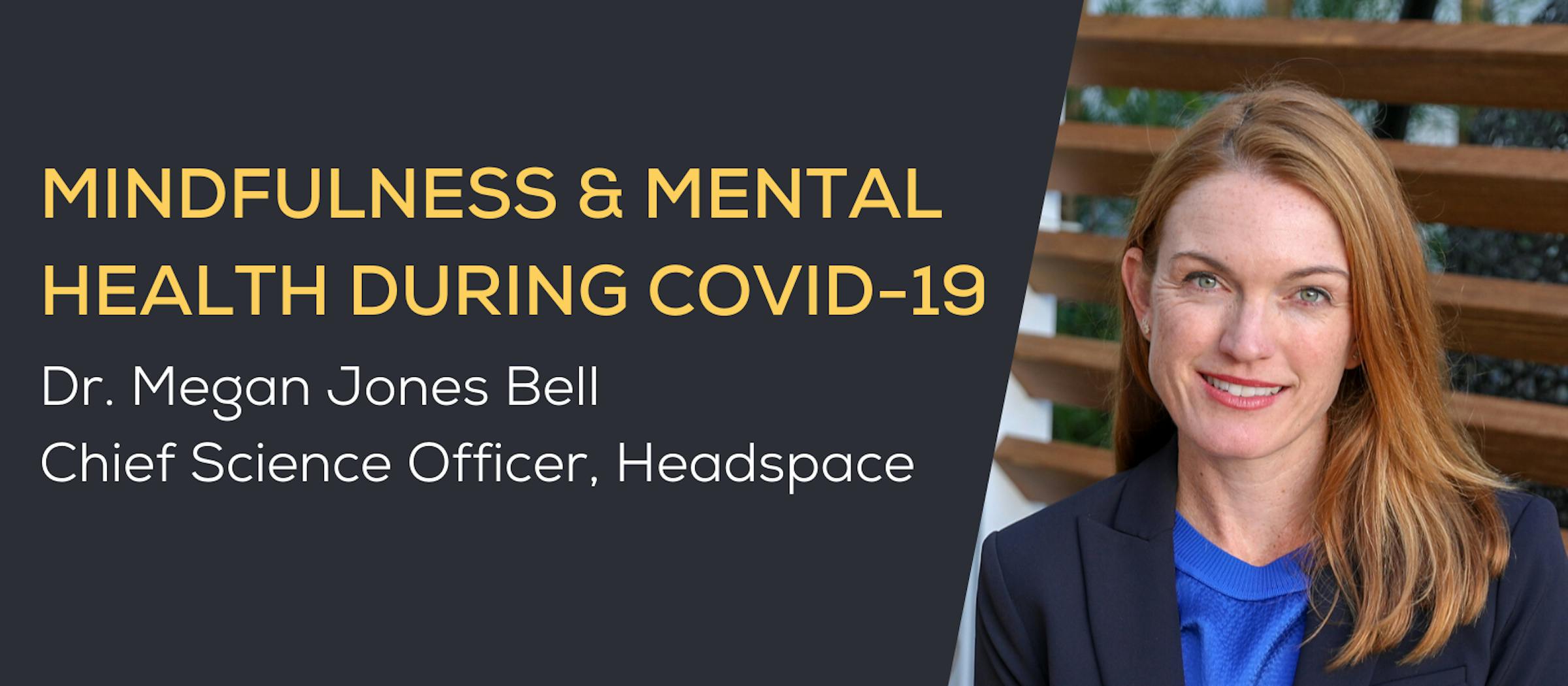Headspace's Dr. Megan Jones Bell talks science and social responsibility in digital mental health
After spending 10 years studying meditation in Buddhist centers of learning across Asia, Andy Puddicombe founded Headspace in 2010 with the goal of improving the health and happiness of the world by making meditation accessible to everyone. With their science-first approach and the wellness movement on their side, Headspace has become a household name and leading app in the mindfulness and mental health space, with more than 65 million users across 190 countries worldwide.
With the onset of the COVID-19 pandemic in March, Headspace’s usership has skyrocketed. Downloads have doubled, sleep music usage has increased by 33 percent, 10 times more users have started stress meditation, and inbound requests from companies seeking support for their employees’ mental health has increased by more than 500 percent.*
To share more about the surge in mental health needs that Headspace is seeing, Headspace Chief Science Officer Dr. Megan Jones Bell joined MATTER CEO Steven Collens for a virtual conversation with the MATTER community. The two discussed the importance of mindfulness, the additional steps Headspace has taken to serve communities in need during COVID-19, and how evidence-based care and a social responsibility to help others remain pillars of the Headspace community.
*All compared to the last 30 days of usage.
Here are our key takeaways from that discussion. Responses have been edited slightly for length and clarity.
A history of social responsibility allowed Headspace to quickly ungate their platform to populations most vulnerable to the COVID-19 pandemic
“At the beginning of March, it was increasingly clear that COVID-19 was going to change our lives in a profound way. We realized the need to catapult ourselves into action to support the mental health consequences of this pandemic. It was at that point when Headspace implemented a number of initiatives to really think through how we could best support the mental health of a large number of people.
“Social impact initiatives at Headspace have been long-standing. Because of these pre-existing partnerships and commitments, we were in the position of immediately moving these initiatives to a broader platform of scale. By ungating access, we were able to immediately:
- Support teachers and parents, as many made the transition to becoming homeschooling parents
- Support frontline healthcare professionals in the U.S., U.K. and France
- Curate a freely-accessible, featured collection of meditations that focus on the kinds of mental health issues people were likely to face during the pandemic: anxiety, uncertainty, change, stress, sleep problems and more.”
Helping people who help people
“We’ve seen incredible adoption among healthcare professionals since COVID-19. The most popular types of content they use are stress management and sleep related mindfulness practices.”
”Healthcare professionals are carrying double the burden of living through all of the same things we are and being on the frontlines of it. In a caring profession, they may be the only person with somebody at the end of their life. They are sitting with an unbelievable amount of suffering, and as a result need to cultivate a certain level of compassion and empathy.
”Healthcare professionals are carrying double the burden of living through all of the same things we are and being on the frontlines of it. ”
“One of the key aspects of mindfulness is learning how to sit with your own suffering, as well as the suffering of others — our society doesn’t teach us that. Mindfulness comes down to awareness and compassion. The core essence of what Headspace is resonates with a profession that centers around helping people.”
The importance of science-based, clinically validated solutions in digital mental health
“Science is core to Headspace’s DNA. Two things must be true of our approach: First, we want to work with authentic experts to ensure there is always qualified expertise behind our content, and second, we want to be backed by science. What this looks like is investing both in ensuring that our approach is based on evidence, and also investing in a second step of validation. Headspace has had a science team for most of its existence, and has been collaborating with academic researchers around the world for years. That has led us to have one of the largest evidence-bases and research portfolios of any digital health company, particularly in the mental health space.”
“To date, we have about 26 published peer review papers (some are efficacy trials, which are rigorous, very conclusive studies, and some are early stage exploratory studies). We have about 50 studies underway with academic partners right now. We have maintained the ethical parameters of independent research and how we work with outside researchers so that they have the freedom to publish whatever they find.
”Our goal is to provide as much transparency and credibility through rigorous research methods so that people understand how mindfulness can help them. It is not our goal to present this as a panacea, but rather to have this adopted appropriately based on evidence into standards of care.
”Our goal is to provide as much transparency and credibility through rigorous research methods so that people understand how mindfulness can help them. It is not our goal to present this as a panacea, but rather to have this adopted appropriately based on evidence into standards of care.”
“We want to help consumers, companies, decision-makers, doctors, psychologists — anybody who is deciding about the care of a population, to make informed decisions.
“Having researched digital health and mental health interventions my whole life, it is apparent to me that things are not created equally. While it may look the same on the surface, it’s really important to look under the hood and ensure that a specific product is actually bringing to life the benefits that you’d expect.
“Often I think many of the entrepreneurs in your community who are working on mental health solutions may find themselves in this situation of, ‘If I have something that could help people right now, and it’s based on evidence, should I put it out into the world or should I keep it back?’ If it’s low risk, if it’s squarely based on evidence, yes. As long as you have the right understanding of safety and how to manage risk.
“But, if you want to actually make claims about your solution and market it as an effective intervention for stress, anxiety or depression, that’s where you really do need to have a solid evidence base behind your specific products…It comes down to ethical concerns in my view.”
Remaining true to the mission of helping others
“Headspace serves different groups in different ways — and that’s intentional. Members who can afford a premium subscription skew coastal, urban, suburban and white. That is actually the rationale behind why we have social impact initiatives. We have an investment in enterprise partnerships and healthcare partnerships, so that we can work with companies, health insurers and health systems to bring access to populations that cannot afford to buy a subscription to an app themselves.
“There’s a business rationale to do that and a mission rationale. When we work with a company like Starbucks, who’s one of our partners, we can enable access to baristas across the world, who typically aren’t a group who can afford to buy a subscription. This does come into play when we choose how to target our customers. We really want to work with companies across the board to support mental health. But, we get really excited when our partnerships allow us to reach populations with unmet needs.”
”We really want to work with companies across the board to support mental health. But, we get really excited when our partnerships allow us to reach populations with unmet needs.”
Balancing business and science
“Our co-founders, Andy Puddicombe and Richard Pierson, have always been extremely committed to science, so the investment in research and development is justified before there is a direct business outcome. Today, science is directly connected to the business strategy that we have across a number of our growth areas. When we sell Headspace to employers as a health benefit, they are digging into our evidence. They’re expecting us to not only point to science in the evaluation process, but also to deliver and prove those outcomes to them within their own population…It’s not enough to just use science to get your foot in the door — we need to deliver if we want to keep that customer.
”It’s not enough to just use science to get your foot in the door — we need to deliver if we want to keep that customer.”
“Leading with science is becoming increasingly essential in a crowded mental health space selling to employers. Fortunately, employers are more and more being given guidance to evaluate their mental health resources across different dimensions of adoption engagement, data security and privacy, evidence, etc. You do need to invest in your capabilities to meet those rising expectations.
“In healthcare, this is where it becomes a strategy question. Without any evidence base, your product could certainly just be added as a perk by an employer or a health insurance company wanting to offer something consumer friendly. But, if you’re really looking to integrate into healthcare and to get a doctor to refer a patient to an app, your product is going to need to have a solid evidence base behind it. Certainly to be on a digital formulary, which is where many of these apps end up so that they can then be prescribed, you’re going to need to go through a number of hurdles. Evidence is one of them.”
Inspired to start your mindfulness journey? Check out Headspace’s mini-meditation.



